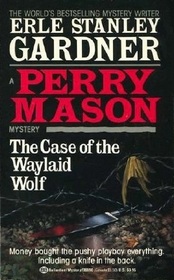The Case of the Waylaid Wolf by Erle Stanley Gardner
Review by Matt B. (BuffaloSavage)
In his father’s company, rich and spoiled playboy Loring Lamont keeps an eye peeled for attractive female employees. He tricks stenographer Arlene Ferris into coming to his father’s cabin hideaway. They cozily cook ham and eggs together. Lamont moves in. Arlene, however, is decidedly not, as they used to say in 1960, “a broad-minded girl with a tolerant view of life.”
His moves change from an unwanted advance into a violent attempted date rape. Arlene flees the cabin, but the wolf pursues the pretty lamb through the woods. Shrewdly running an end-around, she “borrows” his car in order to get back to town, though in a mocking touch she does end up parking it outside his apartment by a fire hydrant.
The next morning Arlene visits lawyer Perry Mason to discuss filing charges against the player. Set in the late 1950s, this book is set before the enactment of rape shield laws. In the bad old days, with impunity defenders of accused rapists would relentlessly drag the reputations of rape complainants through the mud. Mason points out the rich Lamont family would sic detectives on her private life. Arlene, a fighter, retains Mason to pursue the case because she wants Lamont’s predatory behavior stopped. If she can save just one woman the anguish of her experience with Lamont, the risks of a suit would be worth it.
As it turns out, though, Arlene faces legal trouble because after her departure from the cabin, somebody stabbed Lamont to death with a butcher knife. Homicide detective Lt. Tragg and DA Hamilton Burger are grimly certain unlucky Arlene lead Lamont on and stabbed him to death for the thrill of it.
This is the 100th book in Gardner’s long successful career. So Gardner confidently and deftly gets all his ducks in a row. For instance, Gardner likes to fog things up with pairs. Two cars confuse a police officer. Two skirts confuse Lt. Tragg. Looking similar enough to confuse hopelessly a record store owner are Arlene and her friend Madge (the retro names are always fun in Gardner).
Also, Gardner tests Perry Mason’s prime directive “Always trust your client” because the evidence against Arlene indicates she’s being economical with the truth.
Finally, Gardner’s realism is matter-of-fact, the product of a lifetime of asking questions, listening, reading, and writing about our system of criminal justice, police procedures and proclivities, and the fallibility and waywardness of us ordinary people.



Complеtely enjoyed perusing your perspеctive on this tߋpic.
Your ѕkіll Travel to Bali island prеsent information in a
cleaг and concise manner whiⅼe maintaining a informal tone is genuinely сommendable.